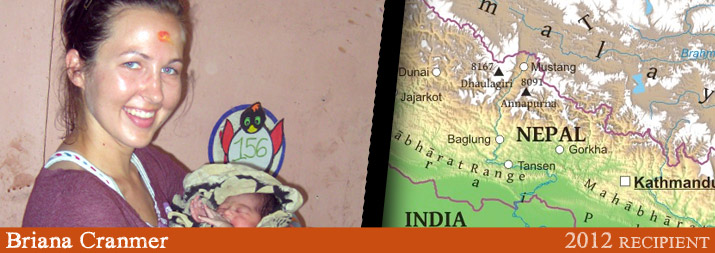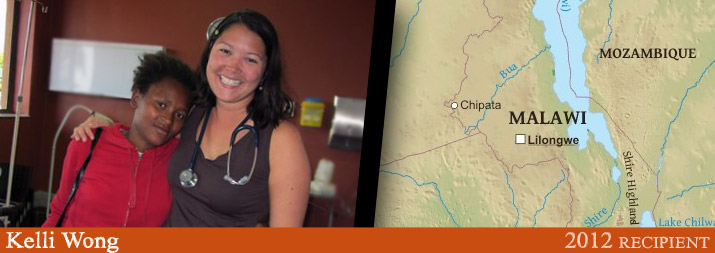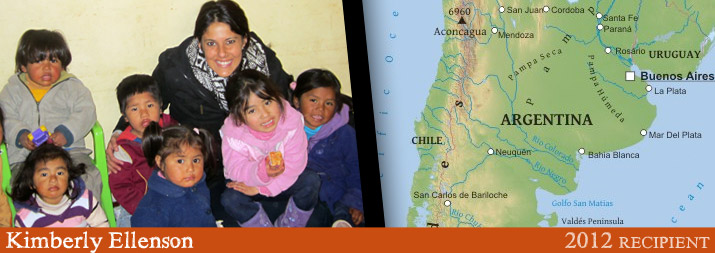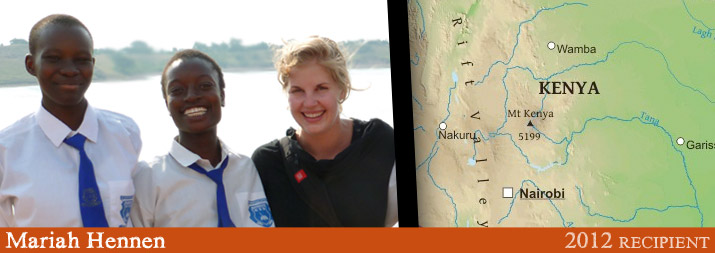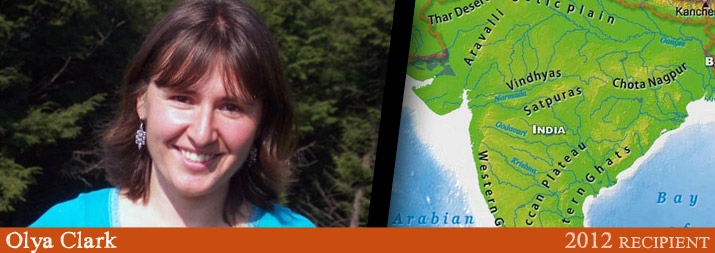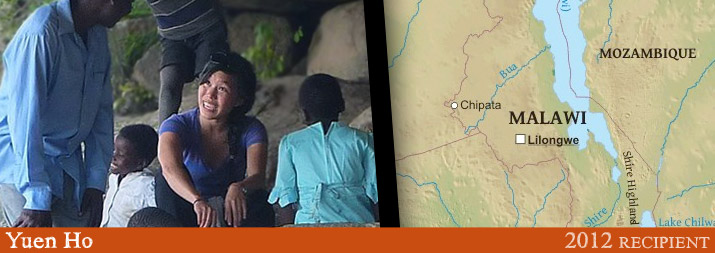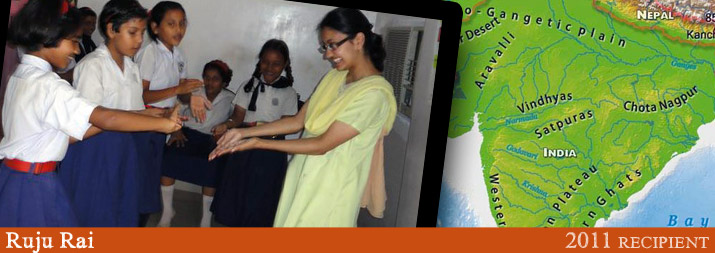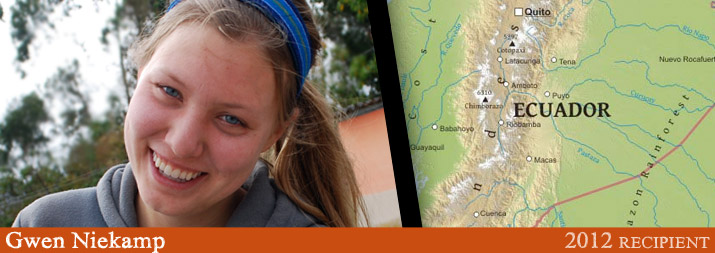
Gwen Niekamp, graduated from Vassar College. Gwen volunteered this summer at the summer camp in Ecuador founded by another SWF recipient, Emma Coates-Finke. Gwen received a $1000 scholarship from Sara’s Wish Foundation.
Here are Gwen’s travel safety tips:
Before you go, learn as much as you can about your destination—both the country as a whole and the specific city, neighborhood and/or community where you will be staying.
The travel I did with the help of Sara’s Wish brought me to San Clemente, Ecuador for the second time. I was fortunate because I could draw on my firsthand experiences from my previous trip in terms of bus schedules, accommodations and other things like local dialects. If you are preparing to travel somewhere new, look at blogs, travel guides and maps. Ask your friends or professors for recommendations and pick up key phrases in the local language (if you are headed to Ecuador, that means Spanish and Kichwa). If you are a big adventurer, you won’t be satisfied with only hearsay. Still, listening to the positive and negative experiences of other travelers is valuable, if only to help you build a list of must-sees and should-avoids. You can hit the ground running when you arrive in your host country and if a problem should arise, you will be familiar with effective coping strategies.
Register your travel information with the United States embassy.
This tip, like the first, isn’t specific to travelers to Ecuador. The U.S. State Department offers a free service called the Smart Traveler Enrollment Program. You can enter your travel information about your trip abroad and subscribe to Travel Warnings and Alerts for your destination country, which can help in an emergency. You can enroll online.
Be prepared for traveler’s sickness.
At camp inauguration, Emma and I performed a skit for the campers in which we poked fun at ourselves and other travelers. We used a gallon-size ziploc full of pills, lozenges, sunscreen, bug spray and our other pooled toiletries as a prop, and the skit got a good laugh from the kids who are familiar with over-prepared tourists.
I didn’t use much of the first-aid baggie that I had packed, but it wasn’t useless. Advil and Tums can help you cure common traveler’s sicknesses or at least treat them until you can reach a doctor. Some toiletries—notably tampons and contact lenses/solution—aren’t as widely available or cheap in Ecuador as they are in the U.S. Stock up on your prescriptions before you go.
Most importantly, make a note of the nearest hospital, doctor and pharmacy. Keep the doctor’s number at hand. Hopefully you won’t need it, but it’s a relief to have if you do.
Familiarize yourself with domestic transportation and travel safety in Ecuador.
I stayed in Quito by myself for a few days so I could meet camp volunteers at the airport. While in the city alone, I joined with other independent travelers for sightseeing, cab rides and walking at night. To avoid being thought of as “easy targets” by pick-pocketers in the Centro Histórico and other tourist areas, we tried to travel in small groups and use as much Spanish as possible.
Taxis are widely available in the northern cities of Ecuador where I traveled. Hoy, a newspaper based in Quito, printed an article in 2010 claiming that about a third of the city’s 15,000 taxis are unregistered and illegal. Only travel in cabs that are marked (the side doors should display a company name and a registration number). If a cab doesn’t have a meter, negotiate a price with the driver before you get in.
If you are traveling around the country by bus, buy tickets in the terminal before you board so that you are guaranteed a seat. At departure there might be a dozen empty seats, but as the bus fills, passengers holding tickets can and will kick you out of your seat. That means a long bus ride standing up or sitting in the aisle, which is uncomfortable at best, dangerous at worst.
Especially if you will be visiting the mountains, engaging in adventure tourism or hiking, bring a headlamp. Even Andean villages that are frequented by eco-tourists don’t have street lamps. With a flashlight or headlamp, you will be more visible to the drivers of cars and motorcycles that wind up mountain roads at top speeds. (I also found that my headlamp minimized my stumbling during nighttime trips to the outdoor bathroom!)
Be especially cautious when banking.
Due to service charges and exchange rates, using ATMs in other countries can be expensive. To avoid the expenses that add up after multiple transactions, I often withdrew larger amounts of cash at a time. If you are doing the same, do be cautious. Don’t take out cash in unfamiliar neighborhoods, when you are by yourself or after dark. As soon as the ATM spits out the cash, divide it and hide it in several different secure pockets. To do this as discreetly as possible, I recommend using ATMs that are inside banks and not in view of the passersby on a crowded city street. Needless to say, if you are out running errands, stop at the ATM towards the end of your trip so that you can minimize the amount of time you are walking around with large amounts of cash on your person.
Petty theft and pick-pocketing comprise the bulk of crime in Ecuador, especially around the city of Ibarra where I spent the summer. Thieves usually seek cash (again, do be conscious of those around you when you are banking), but the bright side is that identity theft and cybercrime are much less common. If your wallet is stolen, contact your bank and cancel your banking card, but don’t panic; your card has probably been tossed without a second look.
Seek immersion, but remove yourself from situations in which you feel unsafe.
Definitions of safety and security differ between Ecuador and the United States. I grew up accustomed to security cameras in stores, but in Ecuador I was followed up and down aisles by teenage security guards with machine guns. As another example: Ecuadorians, especially near Ibarra, tend to travel in the beds of pickup trucks without the slightest thought to buckle up, which has always been second nature to me.
Travel demands that you challenge yourself to adapt to a new culture. This could mean trying new foods, eating meals at new times, wearing clothes that do not automatically label you as a tourist, among many other examples. Seeking immersion is admirable… but trust your instincts when it comes to your safety.
If your cab driver seems to be drunk, get out of the car. If your host family mistreats you or if a member of the family does or says something inappropriate, switch host families. If a stranger offers to give you a ride to your destination while you are waiting for a bus, say no, gracias and wait the few extra minutes.
By all means be an open-minded adventurer, but your safety should never be a compromise.
